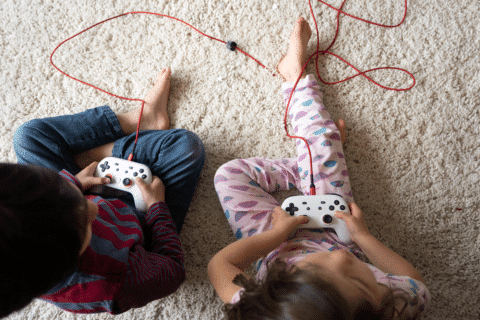Mention that you’re expecting a baby and along with “Congratulations!” friends and family members might also say: “You’ll enjoy every minute!” or “Babies bring pure joy to your life!” While starting a family is a meaningful life event, caring for a newborn is also a full-time job that’s filled with around-the-clock feedings, diaper changes, and sleep deprivation.
As a psychologist, many parents have told me it was difficult to adjust to their new identities, often joking that “labor” didn’t end once the baby had arrived. And while most mothers and fathers aren’t huge fans of sleepless nights and cleaning up spit-up, parenting classes somewhat prepared them for this part of the transition. What caught them off guard was how much parenthood altered their partnerships.
Research shows that babies can wreak havoc on one’s relationship. In fact, during the early years of parenting partner satisfaction takes a dip. With less time for date nights, intimacy, and conversation, many new parents can feel under-appreciated and emotionally detached from their partners. It’s also not unusual for couples to grieve their life as a duo.
Learning about the common relationship pitfalls that parenting may bring can help prepare you for this change.
Struggling to find time to communicate with each other
“I don’t even have time to talk to my husband, let alone fight with him,” is a common concern for many new mothers. Sorting through differences can be difficult, even for the happiest of couples. Once the baby arrives, finding time to talk through conflict can feel more challenging than running a marathon. But learning a couple of communication hacks can help, especially during the early weeks of parenting when you’re in “survivor” mode.
Set boundaries.
It might sound basic, but boundary setting can prevent feelings like anger and disappointment from getting out-of-control. This might mean agreeing to use “I” statements when discussing hot-button topics, or swearing off arguing in the middle of the night. Setting aside time to talk each day, even if it’s just for twenty minutes, also nurtures partner communication. During this time, you and your partner may prioritize topics that feel most important to both of you. You can also find ways to communicate about household responsibilities by setting up a shared calendar or app, texting about your daily tasks, or even using an old-school whiteboard on the fridge to share reminders.
Feeling under-appreciated
It’s common for partners to feel like the baby’s needs take center stage, which can make it difficult to find time to nurture each other. When necessities like showering and sleep seem like luxuries, it’s easy to forget that self-care is an essential part of well-being.
You don’t need to lavish each other with expensive gifts in order to express appreciation. Finding small ways to show that you care can make a world of difference. Expressing gratitude for each other, offering a compliment, or buying each other a small present, like a book, flowers or a bottle of wine can sprinkle joy into your relationship. Not only do these acts of kindness bolster your partnership; they also help prevent “parenting burnout,” the feeling caused by continually sacrificing our needs for others.
Discovering differences in parenting philosophies
In an era when “attachment,” “hand in hand,” and “slow” have become parenting philosophies; it’s easy to forget that most of us learned Parenting 101 from our own parents. Whether we realize it or not, many of the lessons we hope to teach our kids stem from how we were raised. And since we all come from various family cultures, it’s common for child-rearing to bring up disagreements.
It doesn’t necessarily take years for these differences to cause tension. For example, during the first few months of the newborn’s life, moms and dads may disagree about letting the baby “cry it out,” co-sleeping, and whether or not to give the baby a pacifier.
While it’s impossible to know how you’ll feel about parenting beforehand (and it’s entirely possible for those feelings to change after your baby is born), identifying potential parenting differences can be beneficial. You can begin by discussing how you imagine raising your child, talking about things like discipline, celebrating holidays, screen time, and school plans. From there, identify what you value the most and try to meet somewhere in the middle. It may also be helpful to read a few parenting books together. Having a book to focus your discussion can help clarify what the other wants, and may be helpful in coming up with a hybrid strategy that works for both of you.
Feeling financially stressed
You know babies are expensive. But in the first few months of a child’s life, as you’re simultaneously seeing the immediate effect of daily expenses (diapers, wipes, baby socks — how do these little people need so much stuff?) and considering future education plans, it’s easy to feel overwhelmed by your new financial normal, no matter how much money you make. And of course, with less disposable income, financial stress can mount and affect relationship satisfaction.
Differences often stem from having opposite outlooks on how to handle money. For example, one partner may feel anxious about spending while another may use “retail therapy” as a way to manage stress. Without understanding these differences; the thrifty partner may see the spendthrift as disrespectful or immature. However, talking about these sore spots can help prevent a fall-out.
Budgeting for child-care costs can also give parents an estimate of how much they’ll need to save. And creative strategies, like reaching out to friends and neighborhood groups to purchase used baby clothing and gear, can save a fortune. If the conversation gets heated, meeting with a financial planner or counselor may help you iron out the conflict.
Finding less time for intimacy
Continually caring for a newborn and feeling fatigued can put a damper on physical intimacy. Many new parents feel too “touched out” by their kids to be able to focus physical attention on their partner. But even if your love life falls to the back burner, you don’t have to let this change become your new normal. Commit to physically connecting with each other each day by holding hands, cuddling, or giving each other a hug.
While going out to dinner can seem tricky with a newborn, try reinventing date night. Try a meal prep kit together, sit outside on the patio with the baby monitor and dessert when your child has gone to bed, make a daily habit of spending ten minutes not talking about the baby or work, or go through a list of five things you’re grateful for each day. Doing meaningful activities together can help maintain intimacy. It might feel more challenging, but a little effort goes a long way.
It’s an adjustment — and it’s normal
Navigating the challenges that parenting brings can be taxing. If it feels like you’re buried under a blanket of stress, or you’re snapping at your partner more frequently, couples therapy might help. Your relationship doesn’t need to be in dire straits to benefit from seeing a couple’s therapist. Even a few counseling sessions can help partners reconnect and overcome communication roadblocks.
If you’re looking for a creative alternative to therapy, research shows that watching and discussing romance movies, like “Steel Magnolias” and “This is 40” can be just as effective as seeing a counselor. Known as the “Love Story” intervention, researchers have found that movie watching can be a non-threatening way to approach difficult conversations.
So put the baby to bed, cuddle on the couch and queue up the Netflix — and remember, even on the most spit-up covered day, you’re in it together.
Dr. Juli Fraga is a psychologist and health writer in San Francisco. As a psychologist, she specializes in women’s reproductive health. You can find her on Twitter @dr_fraga.







